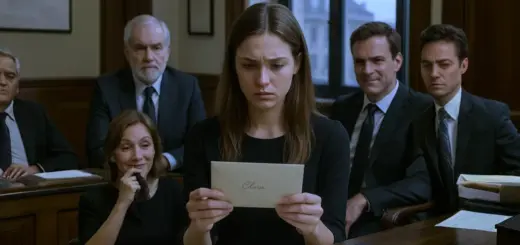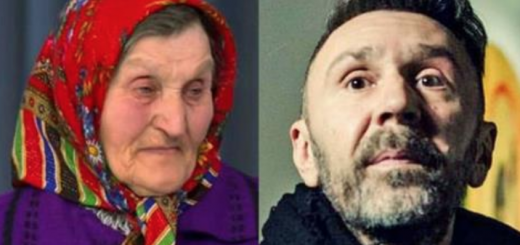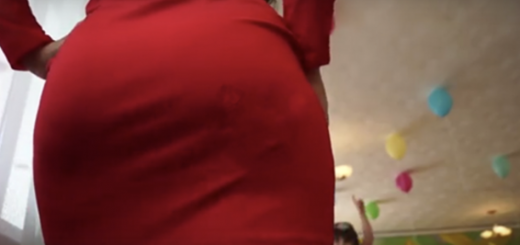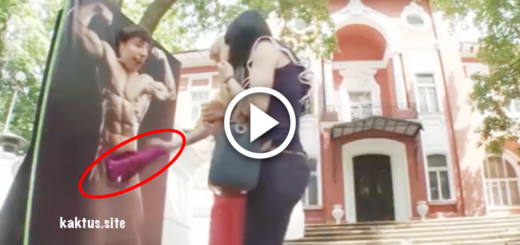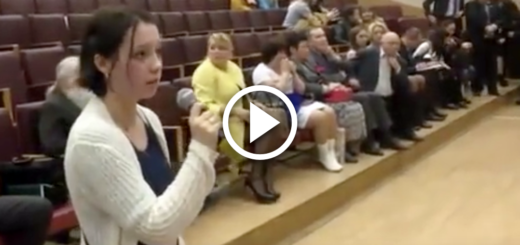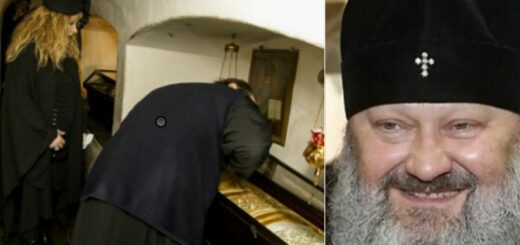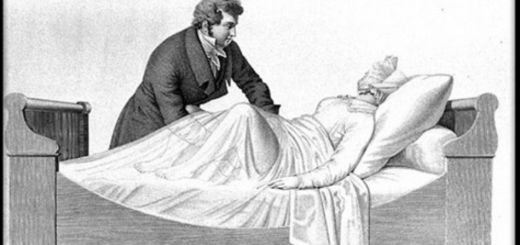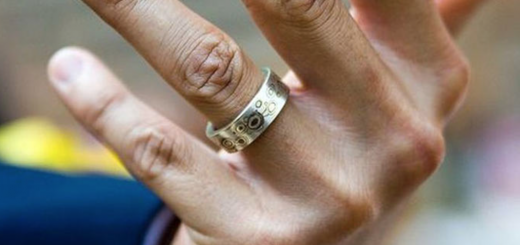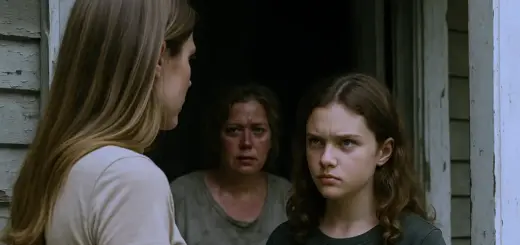Warren’s mouth opened and closed like a fish gasping for air, but Judge Garrett wasn’t finished.
«Furthermore, I’m forwarding this case to the district attorney for potential criminal prosecution for perjury. And Mr. Coleman, I have the text message you sent regarding the father-daughter dance. Choosing another child over your own, then putting that cruelty in writing? That speaks to your character more than any financial document could. I’m ordering supervised visitation only, pending a full psychological evaluation.»
The gavel came down with a finality that echoed through the courtroom. Warren Coleman, the man who’d treated fatherhood as an optional hobby, finally faced consequences he couldn’t charm his way out of.
The immediate fallout from that Friday hearing was swift and merciless. Warren’s house of cards didn’t just fall; it exploded. Within a week, the IRS had frozen two of his accounts pending their investigation.
His biggest client, Robert Hutchinson, a man with four daughters of his own, pulled a $3 million property deal after hearing about the father-daughter dance incident from his wife, who happened to be on the Willowbrook Elementary PTA board with me.
Word travels fast in our town, especially when it involves a man who chose his stepdaughter over his biological child.
Stephanie filed for divorce the following Monday. She called me that evening, crying and apologizing. «I packed Harper’s things, and we’re staying with my mother. Harper keeps asking if Bridget is okay. She made her a card that says, ‘I’m sorry your daddy was mean.’ A seven-year-old understands what Warren doesn’t.»
The country club wives who used to invite Warren to every charity gala and networking event suddenly found their guest lists full. Margaret Whitley, the queen bee of social society, made it clear at the next PTA meeting: «A man who abandons his daughter for someone else’s child isn’t welcome at family events.»
Warren went from golden boy to pariah in less than two weeks. But the real justice came in smaller, more personal moments.
Warren started sending expensive gifts to the apartment, trying to buy his way back into Bridget’s good graces: an iPad, a designer backpack, tickets to Disney World, even a $1,000 shopping spree offer.
Each time, Bridget would look at the gift, then at me, then make her decision. «Send it back, Mom,» she said every time. «I don’t want things. I wanted him.»
Three months after the dance, Warren showed up at our apartment unannounced on a Saturday morning, his supervised visitation request still pending. He stood in our doorway with tears in his eyes. Whether real or calculated, I couldn’t tell.
«Please, Francine, let me talk to her. I need to explain.»
«Explain what, Warren? How a stranger’s child was more fun than your own daughter?»
«I made a mistake. Stephanie was pressuring me, and I wasn’t thinking clearly.»
Bridget appeared behind me in her pajamas, holding the book she’d been reading. She looked at her father with eyes that had aged years in months. «You didn’t make a mistake, Daddy. You made a choice. Mistakes are accidents. You chose Harper.»
Warren tried to reach for her, but she stepped back. «Bridge, princess, please. I’m your father.»
«No,» she said with a composure that stunned us both. «A father shows up. A father keeps promises. A father doesn’t trade his daughter for someone ‘more fun.’ You’re just the man who sends checks now. And you know what? That’s better than the man who sent lies.»
She turned and walked back to her room. She didn’t slam the door, just closed it quietly. That dignity in a 10-year-old devastated Warren more than any court judgment could.
He stood there in our doorway, this man who’d once charmed everyone he met, now unable to charm the one person whose love should have been unconditional. «When did she become so cold?»
«She’s not cold, Warren. She’s protected. There’s a difference.»
Six months later, Warren had paid his back support in full, mostly because the alternative was jail time. His real estate business took a significant hit when word spread about his character. Turns out, people don’t trust a realtor who lies to judges.
Stephanie’s divorce took half of what was left. The IRS took their share. The man who once bragged about his BMW and Rolex was driving a 10-year-old Honda and living in a one-bedroom apartment on the wrong side of town.
But here’s what Warren never understood and what Bridget learned too young: actions echo. That one text message, those three words, «she’s more fun,» created ripples that destroyed everything he’d built on lies and ego.
He lost his wife, his reputation, his wealth, and most importantly, the respect of a little girl who once thought he hung the moon.
A year after the dance, Willowbrook Elementary held another father-daughter sweetheart dance. This time, Bridget didn’t even mention it.
But Jerome, my brother-in-law, the judge who’d started the avalanche of justice, called me a week before. «Gloria and I were thinking,» he said. «I never had daughters, just sons. Would Bridget consider letting her Uncle Jerome take her to the dance?»
When I asked Bridget, her face lit up for the first time in months. «Uncle Jerome wants to take me? Really?»
She wore the same pink dress, let out a bit because she’d grown, but still perfect. Jerome showed up in a full tuxedo with a corsage and a nervous smile. «I’ve presided over hundreds of trials,» he told me, «but I’ve never been more nervous than I am right now.»
They danced every dance. Jerome’s six-foot-four frame bent awkwardly as Bridget stood on his shoes for the slow songs. He learned the Cha-Cha Slide and the Cupid Shuffle. He held her hand during the father-daughter spotlight dance.
And when she started crying, he knelt down and whispered, «You’re worth a thousand dances, Bridget. Don’t ever forget that.»
The photo from that night sits on our mantle now. Jerome in his tuxedo, Bridget in her pink dress, both laughing as he spins her around.
It’s next to another photo from three months ago at Bridget’s middle school graduation. She won the Citizenship Award for standing up to bullies and helping younger students. In her acceptance speech, she said, «My mom taught me that sometimes the bravest thing you can do is ask for help, and the strongest thing you can do is refuse to accept less than you deserve.»
Warren wasn’t there, of course. He’d lost his supervised visitation rights after failing to show up three times in a row. But Jerome was there. Gloria was there. My parents were there. And Melody and her family were there. Bridget’s real family, the ones who chose her every single day.
The pink dress still hangs in Bridget’s closet, but not as a reminder of pain. She keeps it as proof that sometimes the worst moments in our lives become the catalyst for the best changes. That dress represents the night she stopped waiting for a father who wouldn’t show up and started recognizing the family who always would.
Warren still sends checks, now garnished directly from his wages. Sometimes he includes notes asking for forgiveness, updates on his life, pleas for another chance.
Bridget throws them away unopened. «I’ve forgiven him, Mom,» she told me last week. «But forgiveness doesn’t mean access. He taught me that when he had access to me and chose someone else.»
My daughter is 14 now, and she’s never waited by a window for anyone again. She doesn’t make excuses for people who disappoint her. She doesn’t accept less than she deserves.
She learned at 10 what some people never learn: that blood doesn’t make someone family. Showing up does. And that sometimes the universe delivers justice not through grand gestures or dramatic confrontations, but through a quiet phone call from a mother who’s finally had enough.
The last time I saw Warren was at a gas station six months ago. He’d aged 10 years in two. His hair was completely gray, his expensive suit replaced by khakis and a polo shirt.
He saw us, started to approach, but Bridget simply took my hand and said, «We don’t know him anymore, Mom.» We got in our car and drove away, leaving him standing by pump three, finally understanding what it felt like to be left behind.
Some might say I was cruel, that I should have protected Warren’s relationship with Bridget despite his failures. But I didn’t destroy their relationship. I simply stopped protecting him from the consequences of his choices.
There’s a difference between keeping peace and keeping secrets, between forgiveness and enabling, between a father and a man who shares DNA.
Bridget learned that night in the pink dress that she was worth more than someone’s convenience, more than empty promises, more than being second choice. And that lesson, painful as it was to learn, became her armor against a world that would try to convince her otherwise.
That’s not a tragedy. That’s a triumph.


